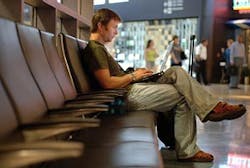Boston Airport, Continental Airlines in Spat Over Wireless Service
BOSTON (AP) -- Logan International Airport is trying to block Continental Airlines from providing free wireless Internet access to its frequent fliers - a service for which the airport charges a daily $7.95 fee - calling it a threat to security.
The Massachusetts Port Authority, which operates Logan, claims Continental's Wireless Fidelity, or ''Wi-Fi,'' service interferes with other wireless devices, posing a threat to public safety and airport security.
Continental rejects that claim, however, and argues Massport has no legal authority to restrict its use of the technology.
After Massport ordered Continental to remove the Wi-Fi antenna from its Presidents Club lounge by July 9, the Houston-based airline filed a complaint with the Federal Communications Commission.
The airline argues that restrictions on the installation and use of Wi-Fi antennas are prohibited under FCC regulations.
''We believe that offering the free Wi-Fi service at Logan is consistent with FCC regulations and its prior rulings, and is permitted by the terms of our lease with Massport,'' Continental spokeswoman Julie King said Thursday.
A Massport spokesman declined to comment on Continental's complaint, which an FCC spokesman said is the first of its kind involving Wi-Fi access at airports.
The FCC isn't expected to rule on the dispute before Aug. 29, its deadline for accepting public comments on Continental's complaint.
All 27 of Continental's frequent-flier lounges have offered free Wi-Fi service since last December. The airline's lounge at Logan has been wired for wireless since June 2004, but a year passed before Logan warned Continental in writing that the Wi-Fi antenna violated the terms of its lease.
Last month, a Massport attorney warned the airline that its antenna ''presents an unacceptable potential risk'' to Logan's safety and security systems, including its key-card access system and State Police communications.
Massport told the airline it could route its wireless signals over Logan's Wi-Fi signal, at a ''very reasonable rate structure.'' In response, however, Continental said using Logan's Wi-Fi vendor could force the airline to start charging its customers for the service.
Craig Mathias, founder of the Ashland-based Farpoint Group wireless consulting firm, said Wi-Fi signals can interfere with each other, but not with other wireless devices.
''It's hard to imagine how this is a security threat,'' Mathias said. ''They clearly don't want the competition.''
